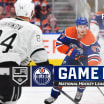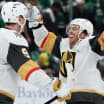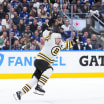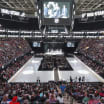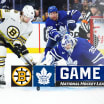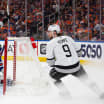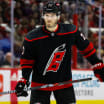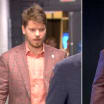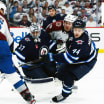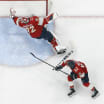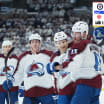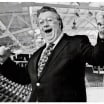Legendary hockey writer Stan Fischler writes a weekly scrapbook for NHL.com. Fischler, known as "The Hockey Maven," shares his humor and insight with readers each Wednesday.
This week, Fischler tells the story of defenseman Pat Egan, who thought his NHL career was over when he reported for duty in World War II, only to have a successful second act after the war.
Fischler interviewed Egan in Berkeley Heights, New Jersey, in the 1990s.
Egan had successful second act in NHL after World War II
Defenseman scored hat trick as rookie, then revived career with Bruins, Rangers
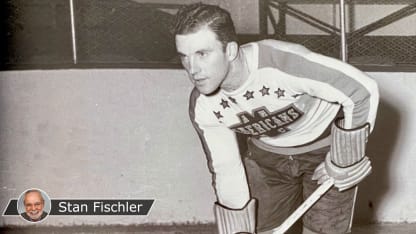
By
Stan Fischler
Special to NHL.com
Pat Egan thought his NHL career was over when the Brooklyn Americans folded in the spring of 1942.
Formerly the New York Americans, the club had its name changed in 1941 by manager-coach Mervyn "Red" Dutton, though the Americans continued to share Madison Square Garden with the rival New York Rangers.
"When the Americans folded, I was a man without a hockey team," Egan said. "World War II was on, so I left the NHL and joined the Canadian Army. I had no idea if I'd have another hockey career."
After his armed forces stint was completed, Egan learned that his NHL rights had been claimed by the Detroit Red Wings. So he returned to the NHL and played 23 games for the Red Wings in 1943-44 and then was traded mid-season to the Boston Bruins, where he anchored the Bruins defense until 1949.
"Once Detroit claimed me and then Boston got me, I found a new hockey life," Egan recalled. "But, that said, I'll never forget the Americans. I had some of my most fun playing for Red Dutton and fulfilled my childhood dream."
After growing up playing hockey in Blackie, Alberta, a hamlet in the foothills of Canada's Rocky Mountains, Egan set off on the long trail to the NHL. His teams included the Calgary Radios, Nelson Maple Leafs, Sudbury Frood Tigers and eventually the Seattle Seahawks.
"When I got to Springfield (in 1939) -- the Americans farm team in the [American Hockey League] -- Red Dutton scouted me and finally I got my shot at big league hockey."
It was late in the 1939-40 season when the Americans blended aging stars such as Charlie Conacher with eager rookies like Egan. On the night of March 17, 1940 Egan showed why this young, belligerent Irishman belonged with the best.
"It was St. Patrick's Day in Toronto," Egan chuckled, "which was a really big day for me, but that night was even better. The Maple Leafs had a really good team with Hall of Famer Syl Apps at center and another Hall of Famer, Turk Broda, in goal.
"But Irish luck was on my side. Dutton gave me a lot of ice time and I made the most of it. Late in the second period the Leafs were crowding our zone when I got the puck and took off on a breakaway."
Egan beat Broda at 17:04 with assists going to Tommy Anderson and Johnny Gagnon. That gave the Americans a 3-1 lead. But Egan's heroics were just beginning that night at Maple Leaf Gardens.
"I beat Broda a second time with a shot over his pads and then I got really lucky," Egan said. "Less than two minutes later I took a shot and all I know is that it deflected off something and wound up hitting Turk in the neck and slipped down his back, and in!"
What made Egan's feat so remarkable was that he had become only the second defenseman in NHL history to score a hat trick. The first was scored by former Maple Leafs and Americans defenseman Clarence "Hap" Day.
"The difference between us," Egan remembered, "was that Hap had been around the NHL a long time and I still was a raw rookie."
Dutton was impressed enough to keep Egan with the Americans through their final season in 1941-42, when he scored an NHL career-high 28 points (eight goals, 20 assists) in 48 games. By that time, he had earned the nickname "Boxcar" because of his husky, freight-train-like build.
"I always loved a rugged, hard-hitting game and when I got to Boston, I could tell that Bruins fans enjoyed tough hockey as much as any in the League," Egan said. "I was right at home in Boston Garden."
Although he was a favorite of the "Gallery Gods," Egan eventually was traded. The Bruins had their eyes on Rangers defenseman Bill Moe, who was from Danvers, Massachusetts. Egan was traded to the Rangers before the 1949-50 season.
"We loved Moe for his sensational hip checks," Rangers manager Frank Boucher said, "but Egan had more to his game and Pat could hit as hard as Bill. It was a good trade for us."
In an interview with author Chuck O'Donnell for the book, "The Game I'll Never Forget," Egan said his final goal was to play for a Stanley Cup champion; and he came within a goal post of doing so.
"We managed to make the 1950 playoffs and were huge underdogs in the first round against Montreal," Egan recalled. "But our goalie, Chuck Rayner, was hot and their guy, Bill Durnan, was not. We beat the Canadiens in five games -- a big upset -- and that put us in the Cup Final against Detroit.
"It put us up against the best team in the League. If that wasn't tough enough, we weren't able to play any home games at Madison Square Garden because the circus had taken over."
The Stanley Cup Final went seven games of which five were played at Olympia Stadium in Detroit with the other two Rangers "home games" at Maple Leaf Gardens. Miraculously two overtime goals by Rangers center Don "Bones" Raleigh enabled New York to grab a 3-2 lead in the series.
But the Red Wings managed to rebound to win Game 6 and overcome a 2-0 Rangers lead in Game 7, which led to a 3-3 tie after regulation
"In the first overtime we carried a lot of the play and our little center Buddy O'Connor hit the post and then I thought I had the winner set up with center Jack Gordon," Egan said.
"I passed the puck to Jackie and he beat goalie Harry Lumley but his shot hit the post. Then the rebound came out to me but before I could grab it, Lumley swatted it away with his big goalie stick. My luck was running out."
In the second overtime, Red Wings center George Gee won a face-off deep in the Rangers end and skimmed the puck to Pete Babando. Rayner saw the shot a split-second too late and Egan's Cup dream was shattered.
Egan played one more season with the Rangers and then finished his hockey career in the minors. He insisted that his hat trick as a rookie in 1940 against Toronto was his "most memorable" game.
And his stint with the Rangers did carry Egan to within inches of his dream. Losing to Detroit was a setback that, decades later, still stuck in his craw.
"Babando's goal was a bitter pill to swallow," Egan said. "Tough on me and tough on my mates. We Rangers were a tight group and a Cinderella team."
Then, a pause.
"Almost to the very end."
